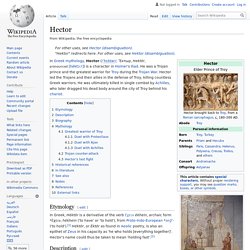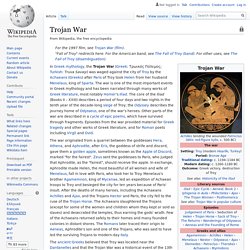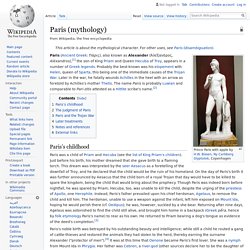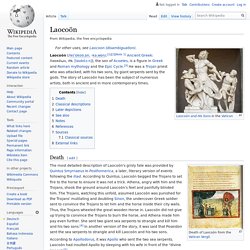

Iliad Book XXII - Achilles Kills Hector. Iliad - Public domain English translation Except for Hector, the Trojans are inside the walls of Troy.

Apollo turns to Achilles to tell him he is wasting his time pursing a god since he can't kill him. Achilles is angry, but turns around to return to Troy where Priam is the first to spot him. He tells Hector he will be killed since Achilles is much stronger. If not killed he will be sold into slavery as has already happened to others of Priam's sons. Hector gives some thought to going inside but fears the ridicule of Polydamas, who had given sage advice the day before. As Achilles bears down on Hector, Hector begins to lose his nerve. Zeus looks down and feels sorry for Hector, but tells Athena to go down and do what she wants without restraint. Achilles is chasing Hector with no chance of reprieve unless Apollo steps in (which he does not do). She adds that she will persuade Hector to do the same. Hector is thrilled to see his brother has dared to come out of Troy to help him.
Reasoning. Hector - Wikipedia. Greek mythological hero Coin from Troy, 177–192 AD; Obverse: Bust of Commodus; Reverse: Hector, brandishing shield and spear, on a two-horse chariot; ΕΚΤΩΡ (Hektor) inscribed above, ΙΛΙΕΩΝ (Ilion, "Troy") in exergue The bronze coin struck in 350–300 BC in Ophryneion, which was considered to be the site of the Tomb of Hector.

Obverse depicts bearded Hector wearing triple crested helmet and reverse depicts infant Dionysos. In Greek mythology and Roman mythology, Hector (; Ἕκτωρ, Hektōr, pronounced [héktɔːr]) was a Trojan prince and the greatest fighter for Troy in the Trojan War. He acted as leader of the Trojans and their allies in the defence of Troy, "killing 31,000 Greek fighters. " Etymology[edit] In Greek, Héktōr is a derivative of the verb ἔχειν, ékhein, archaic form *ἕχειν, hékhein ('to have' or 'to hold'), from Proto-Indo-European *seĝh- ('to hold').[1] Héktōr, or Éktōr as found in Aeolic poetry, is also an epithet of Zeus in his capacity as 'he who holds [everything together]'. Prince Hector of Troy - Character Profile.
Trojan War - Wikipedia. Mythological war Whether there is any historical reality behind the Trojan War remains an open question.

Many scholars believe that there is a historical core to the tale, though this may simply mean that the Homeric stories are a fusion of various tales of sieges and expeditions by Mycenaean Greeks during the Bronze Age. Those who believe that the stories of the Trojan War are derived from a specific historical conflict usually date it to the 12th or 11th century BC, often preferring the dates given by Eratosthenes, 1194–1184 BC, which roughly correspond to archaeological evidence of a catastrophic burning of Troy VII,[4] and the Late Bronze Age collapse. Sources The Burning of Troy (1759/62), oil painting by Johann Georg Trautmann. Paris (mythology) - Wikipedia. Paris’s childhood The Judgment of Paris The goddesses thought to be the most beautiful were Hera, Athena, and Aphrodite, and each one claimed the apple.

They started a quarrel so they asked Zeus to choose one of them. Laocoön - Wikipedia. Trojan priest in Greek and Roman mythology Laocoön (;[1][2][Note 1] Ancient Greek: Λαοκόων, IPA: [laokóɔːn]), the son of Acoetes, is a figure in Greek and Roman mythology and the Epic Cycle.[3] He was a Trojan priest who was attacked, with his two sons, by giant serpents sent by the gods.

The story of Laocoön has been the subject of numerous artists, both in ancient and in more contemporary times. Death[edit] The most detailed description of Laocoön's grisly fate was provided by Quintus Smyrnaeus in Posthomerica, a later, literary version of events following the Iliad. According to Quintus, Laocoön begged the Trojans to set fire to the horse to ensure it was not a trick. Laocoon. The Trojan War in Ares (Mars) Trojan War. One of the most well-known tales ever narrated (most notably in Homer’s “Iliad”), the Trojan War is undoubtedly the greatest war in classical mythology.

ARES - Greek God of War & Battlelust (Roman Mars) Laocoon. Paris. Hector. Ares (God)